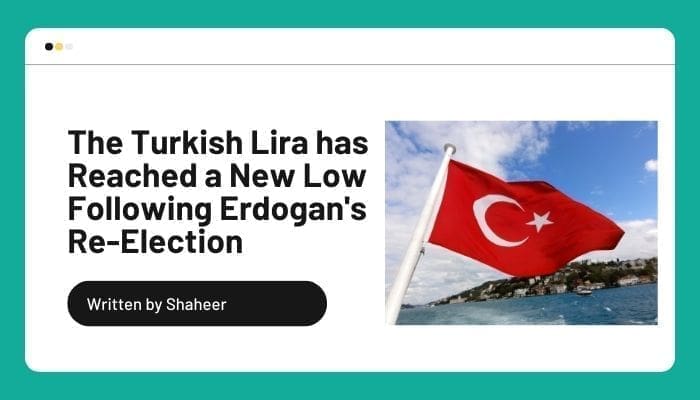ISTANBUL—Turkey’s currency plummeted to a record low on Tuesday, as investors worried that President Recep Tayyip Erdogan would maintain his unconventional approach to managing the country’s troubled finances following his re-election over the weekend.

The lira was last trading at 20.4 to the US dollar, down 1.4%, the currency’s steepest daily loss since June 2022.
Turkey’s economic imbalances, such as the falling lira, a lack of foreign money, and soaring inflation, are shaping up to be Erdogan’s most difficult task as he enters his third decade in power. On Sunday, the Turkish president won a runoff election, defeating an opponent who vowed to reinstate conservative economic policies and attract Western investment.
The lira has lost roughly 80% of its value in the last five years as Erdogan has asserted greater control over the country’s finances, dismissing three central bank governors and pressuring the bank to cut interest rates despite high inflation—the polar opposite of what central banks around the world typically do in such circumstances.
Erdogan claims that his strategy will stimulate economic growth and assure high employment. He has also claimed that lower interest rates will lead to lower inflation. Turkey’s central bank has also spent tens of billions of dollars in recent months to defend the currency, sending the country’s net international reserves into negative territory.
According to analysts, Turkey is on the verge of financial collapse unless Erdogan changes his policies dramatically or receives a bailout from a foreign government.
“I think this is them loosening their grip,” Liam Peach, senior emerging markets economist at Capital Economics, said. “Their firepower has been depleted due to low foreign-exchange reserves.”
During his re-election campaign, Erdogan consistently stated that he would maintain his low-interest-rate strategy. He pushed back against domestic opposition figures who forecast an economic collapse in a speech to Turkey’s Union of Chambers and Commodity Exchanges on Tuesday.
“They were supposed to present this Turkish economy to London loan sharks, but they couldn’t panic our business world,” Erdogan stated. “Every time they open their mouths, they paint a bleak picture of Turkey’s economy.” Please ignore these gloomy forecasters.”
The Turkish government spent lavishly in the months running up to the election, providing free natural gas for a month and increasing central bank interventions to prop up the lira’s value.
Economists say one of the difficulties the Turkish government faces is allowing the currency to depreciate without causing a panic. A sharp plunge in the lira in late 2021 fueled fears that the country was on the verge of a bank run. A weakened lira will exacerbate Turkey’s inflationary challenge by increasing the cost of imports.
“The government is probably aiming for a controlled economic slowdown, allowing the lira to depreciate faster, which is an unavoidable choice given their lack of foreign currency reserves,” said Selva Demiralp, an economics professor at Istanbul’s Koc University and a former economist at the US Federal Reserve Board.
The vast majority of Turkey’s reserves are borrowed. The Turkish central bank employs currency swap arrangements, in which banks and foreign governments sell dollars and other foreign currencies for a limited time in exchange for lira. Turkey’s reserves were negative $60 billion as of May 19, excluding those swaps.
As Western investors withdraw from Turkey, the country has turned to Russia and the oil-rich Persian Gulf countries to help shore up its finances. Last year, Russia donated up to $15 billion to Turkey for the construction of a nuclear power facility. Russia, Turkey’s major natural gas supplier, agreed earlier this year to postpone Turkish payments. In March, Saudi Arabia deposited $5 billion with Turkey’s central bank.
According to analysts, Turkey may handle the foreign currency shortfall by increasing swaps with local banks or asking Gulf countries to agree to exchange in dollars or euros rather than their local currencies.
In order to help stabilize the local currency, the country also requires exporters to convert 40% of their foreign-currency income into lira.
A customized savings system launched in late 2021 encourages Turks to keep their money in lira by assuring that any depreciation in the local currency will be compensated for. Economists believe that the lira’s further decline will raise the cost of paying out such securities, boosting the likelihood of a bigger financial disaster. According to Turkey’s banking authority, deposits in the plan were more than $121 billion as of May 17.
“The question is how they are going to conjure up more dollars,” Erik Meyersson, SEB’s top emerging-markets strategist, said. “They can still pull some rabbits out of the hat, but I think we have six months or a year before things really go south.”

